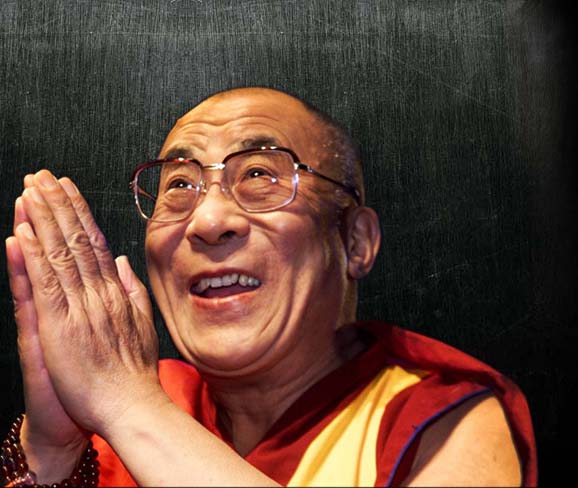
FAYETTEVILLE, Ark. – His Holiness the Dalai Lama will offer a public talk in Bud Walton Arena on Wednesday, May 11, 2011, Chancellor G. David Gearhart announced during a news conference this morning. The Dalai Lama’s visit is in response to invitations from professor Sidney Burris, director of the honors program in the J. William Fulbright College of Arts and Sciences, and Geshe Dorjee, a Tibetan monk and instructor in Fulbright College. The two met with the Dalai Lama during their most recent trip to India in summer 2009.
The Dalai Lama’s visit is being sponsored by the university’s student-funded Distinguished Lecture Series. University of Arkansas students will be able to attend the public talk for free.
“We are indeed honored to have His Holiness visit our campus. He is a spiritual leader respected around the world for his message of compassion, peace and non-violence,” said Chancellor Gearhart.
The chancellor also announced that Burris will lead a committee to plan and organize a year-long series of events leading up to the Dalia Lama’s visit. These events are intended to generate awareness, inform and enhance the issues related to the lecture, and to get the campus community engaged, involved and excited about the visit.
Burris said that several events have already been scheduled, including a visit in September from the Mystical Arts of Tibet group, whose members will construct a sand mandala and demonstrate other aspects of Tibetan culture.
During the news conference Burris also described the relationship that has developed in the past four years among the University of Arkansas, it’s students and the international Tibetan community. Burris credited that relationship with helping to convince the Dalai Lama to accept the invitation to visit Arkansas.
Complete information about the Dalai Lama’s visit and the related events during the upcoming academic year will be available at http://dalailama.uark.edu. The Web page will be regularly updated through the year.
At age 25, the Dalai Lama sat for his final examination in the Jokhang Temple, Lhasa, during the annual Monlam (prayer) Festival in 1959. He passed with honors and was awarded a Geshe Lharampa degree, which is equivalent to a doctorate of Buddhist philosophy.
In 1950, one year after China's invasion of Tibet, the Dalai Lama was called upon to assume full political power. In 1954, he went to Beijing for peace talks with Mao Zedong and other Chinese leaders, including Deng Xiaoping and Chou Enlai. However, in 1959, following the brutal suppression of the Tibetan national uprising in Lhasa by Chinese troops, the Dalai Lama was forced to escape into exile. Since then he has lived in Dharamsala, northern India, where he and his fellow exiled Tibetans have established the seat of the Tibetan Administration in Exile.
In 1989, the Dalai Lama was awarded the Nobel Peace Prize for his non-violent struggle for the people of Tibet. He has consistently advocated policies of non-violence, even in the face of extreme aggression by the Chinese communist government. He became the first Nobel laureate to be formally recognized for his concern for environmental issues throughout the world.
On June 18, 2009, Sidney Burris and Geshe Thupten Dorjee traveled tothe Dalai Lama’s compound in Dharamsala, India, with 15 students from the university. The students were traveling abroad to work on the TEXT Project, or “Tibetans in Exile Today,” an oral-history program designed to record the stories of Tibetans currently living in refugee settlements in India. The project focuses on the Tibetans who left their country in 1959 but still have vivid memories of traditional Tibetan culture.
The Dalai Lama wanted to meet the faculty and students who were working to preserve the history and life stories of a people forced from their homes, some forbidden to ever return.
“Western culture,” Burris explained, “doesn’t have a precise equivalent to the Dalai Lama: he’s both a spiritual and a political leader for the Tibetans, an international spokesperson for human rights and non-violence, and as a recent Harris poll indicated, the most respected leader in the world. While some Tibetans might disagree with his policies, all of them immensely respect his tireless devotion to their welfare.”
In 2007, the Dalai Lama was awarded the Congressional Gold Medal by the president of the United States, George W. Bush.
The Dalai Lama has traveled to more than 62 countries spanning six continents, meeting with the presidents, prime ministers and crowned rulers of most major nations.
Since 1959 he has received more than 84 awards, medals and honorary doctorates in recognition of his message of compassion, peace, non-violence, interfaith understanding and universal responsibility. He has also authored more than 70 books, which include An Open Heart, Ethics for the New Millennium, and The Universe in a Single Atom.
Topics
Contacts
Sidney Burris, director, Fulbright College honors program
J. William Fulbright College of Arts and Sciences
479-575-3599,